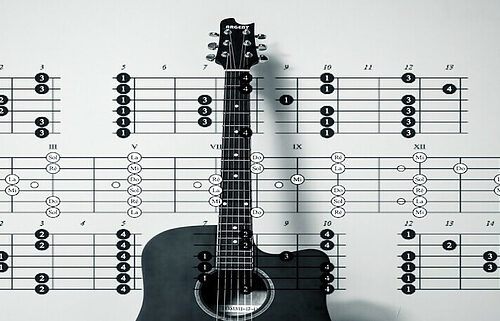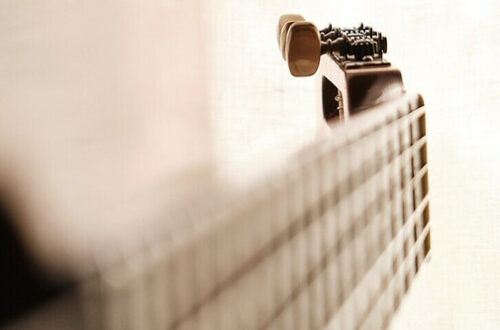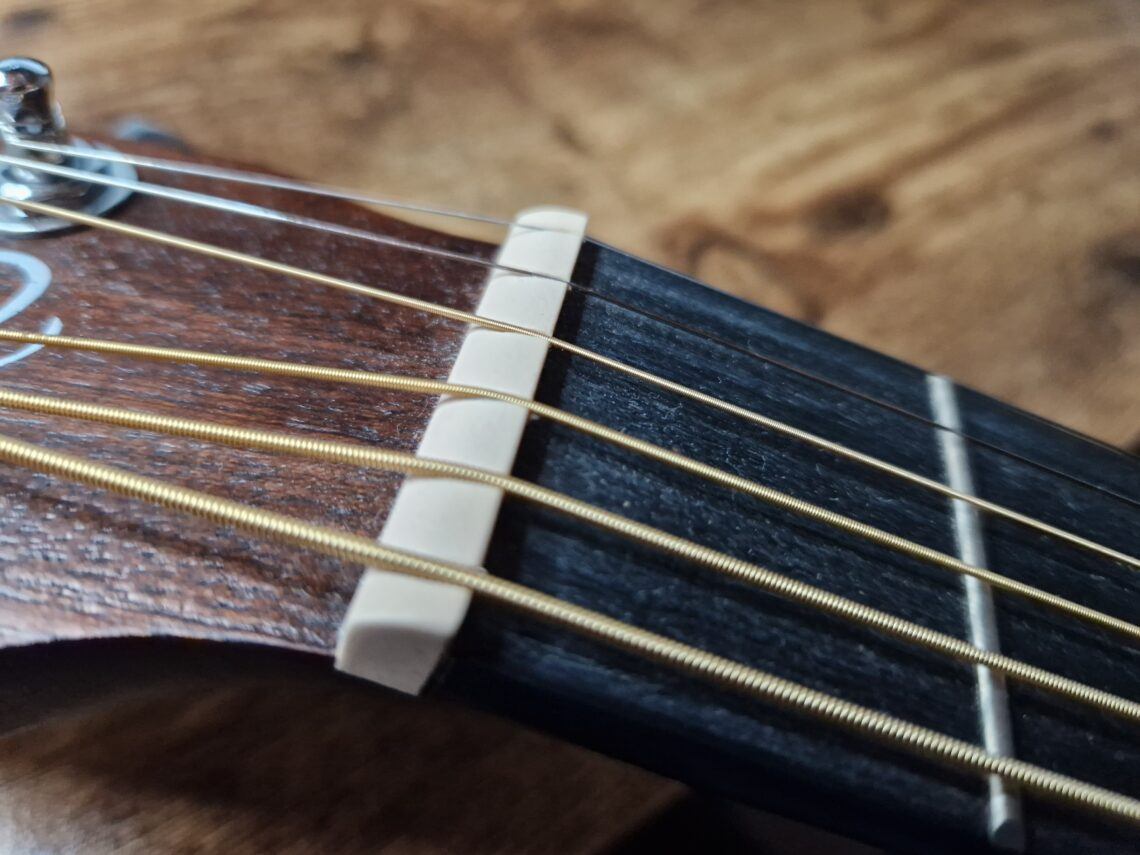
7 Reasons Why You Dont Need an Expensive Guitar as a Beginner
As someone who loves music, I get how exciting it is to start learning the guitar. It’s an adventure filled with hopes of playing amazing solos, strumming beautiful tunes, and wowing people with your music.
But here’s something to think about. Is it necessary to spend a lot of money on an expensive guitar right from the start? I’m here to explain the 8 reasons why you don’t need an expensive guitar as a beginner, by sharing what I’ve learned over the last 4 years and help you decide wisely. Believe me, it’s not all about how much it costs!
Let’s explore the great reasons to pick an affordable guitar when you’re just beginning, from saving money to the personal growth you’ll experience on this path.
Table of Contents
1. Learning The Basics of Guitar First
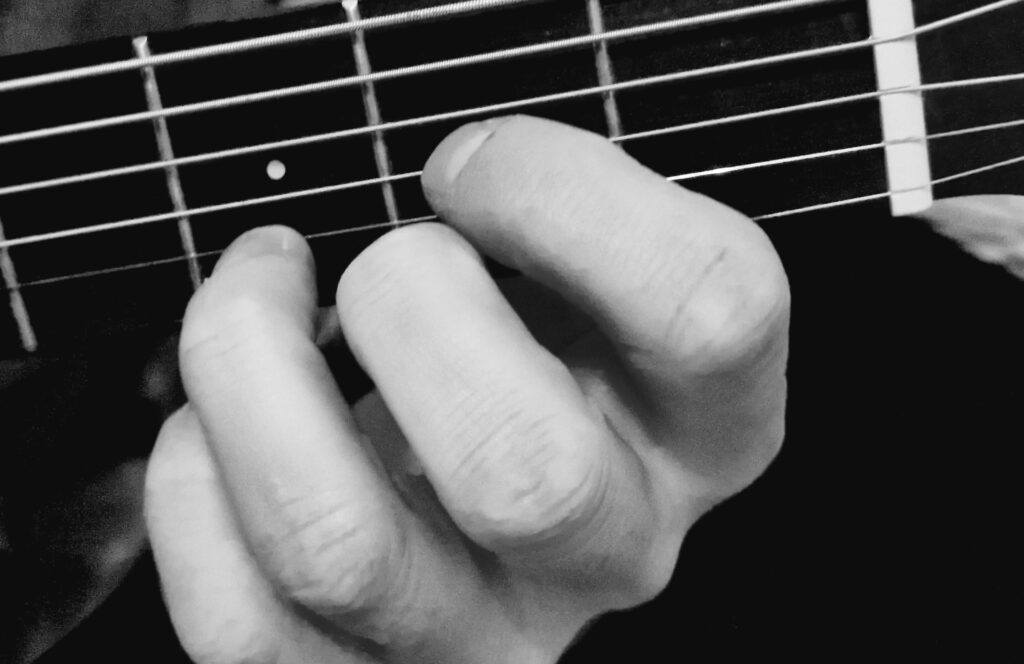
Getting Good at Guitar Starts with the Basics
To get really good at playing the guitar, you need to start with the basics. It’s like building a house, you need a solid foundation before you can add the roof and walls. Getting a strong grip on chords, scales, how to place your fingers, and how to strum is super important. These are the building blocks for everything else you’ll learn on the guitar.
Simple Open Chords For Beginners
Starting Simple
When you’re just starting, beginner guitar lessons are the way to go, whether this be online or in person. They usually introduce you to the guitar in a step-by-step approach that’s easy to understand, showing you how to hold it, some music theory, and basic rhythms. This is your first step on a bigger journey. Think of it as learning to crawl before you can walk.
A Fancy Guitar Won’t Make You Learn Quicker
Some people think that if they buy a really expensive guitar, they’ll learn how to play faster. But that’s not really how it works. Sure, a fancy guitar might have some cool features, but it’s not going to do the practice for you. What really makes a difference is putting in the time and effort to nail those basic skills. That’s what will make you a great guitarist, no matter what guitar you’re playing.
2. Exploring the Value of Budget-Friendly Beginner Guitars

This part of the guide dives into the financial side of choosing your first guitar. We’ll look at why going for a wallet-friendly option can be a smart move, highlight some great affordable guitars out there, and offer tips on managing your guitar-related finances.
Affordable Guitars Offer Great Value
Starting your guitar journey doesn’t mean you need to spend a fortune. There are Loads of great, affordable guitars that don’t skimp on quality or playability. Brands like Fender, Yamaha, and Epiphone have beginner models that are easy on the wallet but still sound fantastic and are built to last. This means you can start learning and improving without having to compromise on the quality of your instrument.
For a deeper dive on picking your first guitar, check out my guide on How to Choose Your First Guitar for beginners.
Keep Your Wallet Happy Now and Later
Opting for an affordable guitar saves you money right off the bat and also sets you up for future financial flexibility. With the money you save, you can invest in essential accessories or lessons to boost your playing skills.
Plus, as you get better and start to develop your own style, you might want to upgrade to a guitar that better suits your needs. Starting with a more budget-friendly option gives you the room to make that upgrade without financial stress.
Smart Financial Tips for Beginner Guitarists
Getting into guitar playing involves some financial planning to ensure you’re spending wisely and saving where you can. Here are some strategies to keep your finances in tune:
- Explore the World of Pre-loved Guitars
Venturing into the realm of used guitars can uncover some incredible finds. Ensure you give any potential treasure a thorough inspection for damage and take it for a test strum to guarantee it meets your expectations in feel and sound.
- Define Your Financial Boundaries
Set a clear budget for your guitar purchase and adhere to it with determination. Embark on a quest to discover the finest guitar that aligns with your financial limits, ensuring you get the most bang for your buck.
- Stay Alert for Special Offers
Keep your eyes peeled for promotions, discounts, or bundle deals that could sweeten the deal with additional accessories or lessons at a fraction of the cost. These opportunities can significantly enhance the value of your investment.
- Prioritize the Fundamentals
Focus your resources on essential items like quality picks, a sturdy case or gig bag, and a strap that ensures comfort during long practice sessions. These basics will significantly impact your playing experience, far more than fleeting gadget trends.
- Leverage the Power of the Internet
Dive into the vast ocean of free educational content available online. From step-by-step tutorials and chord diagrams to comprehensive lessons on platforms like YouTube, these resources can immensely enrich your learning journey, all without the expense of private tutoring.
By following these tips, you can make your guitar learning journey both rewarding and affordable, ensuring you get the most bang for your buck.

3. Durability and Care
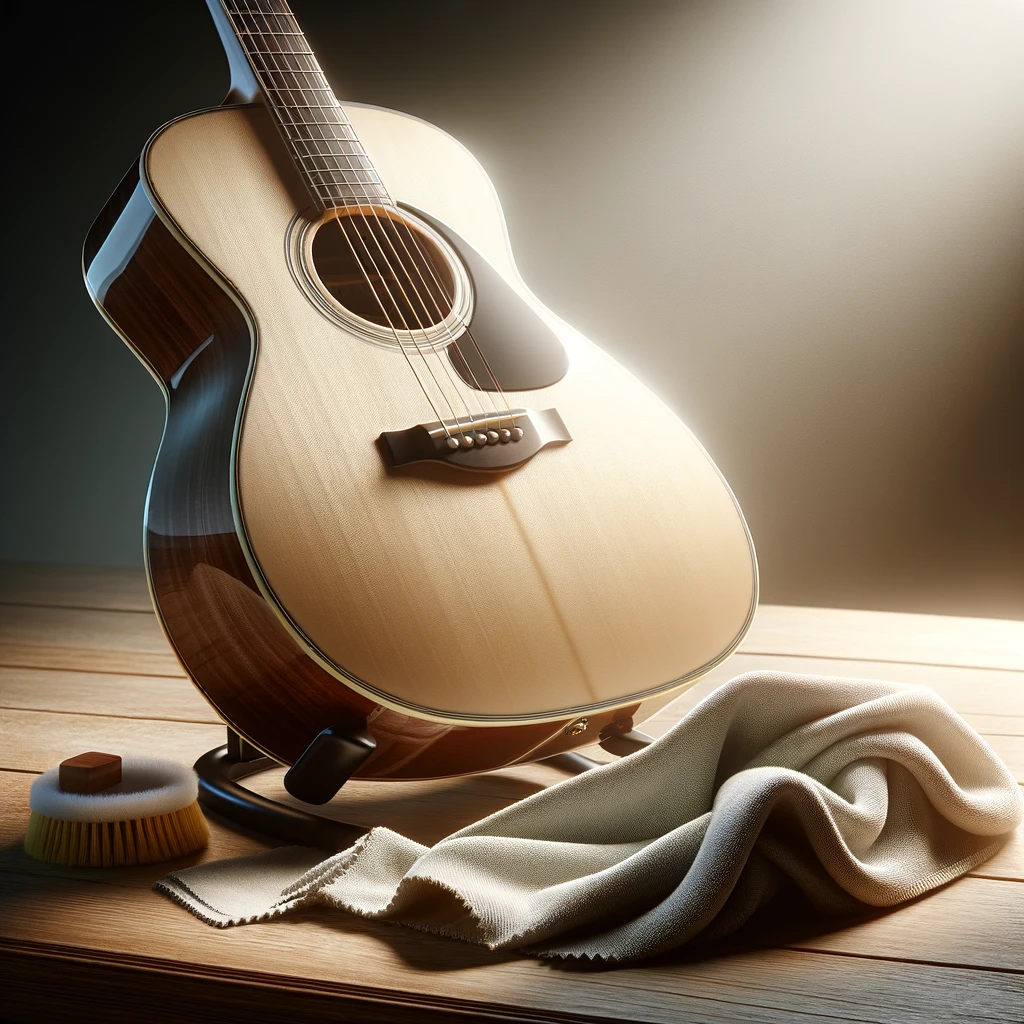
Learning to Care for Your Instrument
Mastering the chords and melodies is one aspect of learning the guitar. Equally crucial is learning to maintain your instrument. Doing so not only ensures the longevity of your instrument but also its peak performance. It’s an aspect often overlooked by beginners, yet it holds immense importance.
Reflecting on my own experience, my first guitar bears the battle scars of numerous dents and scratches. Its modest price tag made these blemishes less of a concern. However, as my journey progressed, so did my appreciation for my instruments. My latest guitar is a testament to this evolution. I now dedicate myself to maintaining its pristine condition, a stark contrast to my initial approach.
This shift in mindset highlights a vital lesson for all beginner guitarists. The value of treating your instrument with care from the start. Imagine investing in an expensive guitar only to neglect its care, exposing it to potential damage. Such a scenario is far from ideal.
Here are some tips and techniques to help you maintain your guitar:
- Keep your guitar clean by regularly wiping it down with a soft cloth.
- Store your guitar in a suitable case or stand to protect it from dust, moisture, and accidental damage.
- Change guitar strings regularly to maintain good sound quality and playability.
- Inspect your guitar for any signs of wear or damage, such as cracks, loose tuners, or buzzing strings, and address them promptly.
- Use a suitable guitar polish or cleaner to maintain the finish and shine of your guitar.
Less Stress Over Damages
Starting your guitar journey is thrilling but comes with its share of mishaps. It’s almost a rite of passage to nick the headstock or scratch the body of your guitar. Opting for a more affordable guitar initially can alleviate the stress over these inevitable accidents. This way, you can pour your energy into mastering the guitar, free from the concern of costly repairs.
Remember, every guitarist, no matter how skilled, has faced their share of instrument mishaps. Choosing a budget-friendly guitar allows you to fully engage in the learning process, free from unnecessary worries.
4. The Journey Matters

Passion Over Price
The journey of learning guitar is where the real magic happens. My conviction is strong, if you’re truly passionate about playing the guitar, the type of guitar you start on is secondary.
The key is that the guitar should be functional and sound decent. Whether it’s a high-end model or a budget-friendly option, the cost is irrelevant in the face of genuine enthusiasm and dedication.
Knowing When to Upgrade
As you progress, there might come a time when you feel ready for an upgrade. This decision should stem from a genuine need for a better instrument to match your evolving skills and musical aspirations. Evaluate your progress and consider if your current guitar is limiting your growth. An upgrade should enhance your playing experience and support your journey towards more advanced techniques and expressions.
However, patience is key. Rushing into an expensive purchase without thoughtful consideration can lead to choices that don’t necessarily benefit your music. Wait for the moment when an upgrade aligns with your skills and goals.
5. Quality of Affordable Guitars
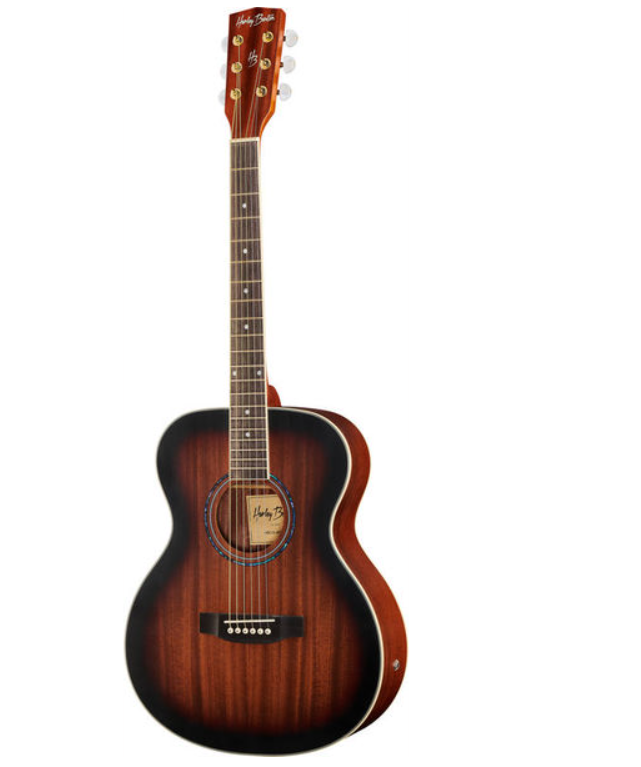
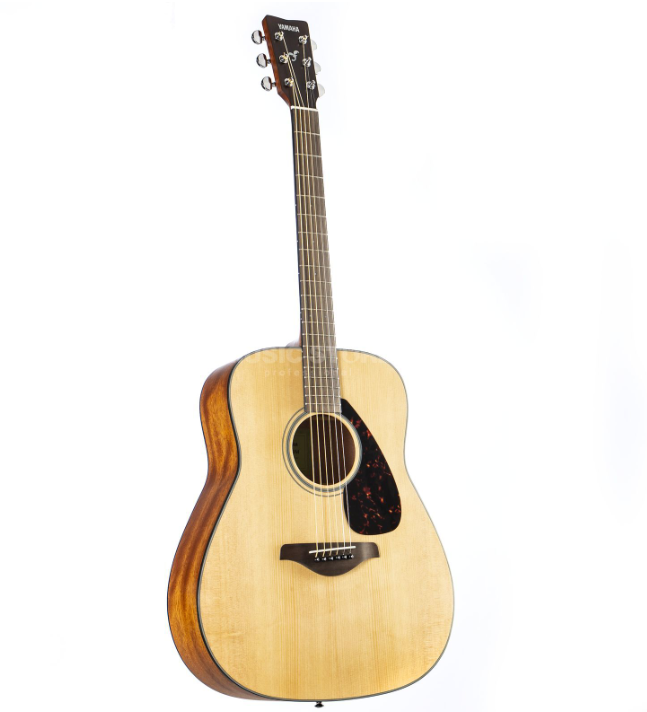
Harley Benton CG-45E Vintage Sunburst
Yamaha FG 800 M Natural Matte
When it comes to affordable guitars, there has been a remarkable advancement in manufacturing techniques that has greatly improved their quality. Gone are the days when inexpensive guitars were associated with poor craftsmanship and subpar sound.
Today, budget-friendly options can offer surprising value and performance. A guitar that costs you $100 – $150 will be more than sufficient in the beginning. Do not let anyone tell you otherwise.
Advancements in Manufacturing
The guitar manufacturing industry has made significant strides in developing cost-effective production processes without compromising on quality. Innovations in materials, engineering, and automation have enabled manufacturers to create affordable guitars that rival their higher-priced counterparts. These advancements ensure that beginner-level guitars now offer solid construction, good playability, and decent sound.
Finding a Hidden Gem
Among the vast range of affordable guitars available, there are hidden gems waiting to be discovered. Occasionally, you come across budget-friendly models that exceed expectations in terms of tone, playability, and overall quality.
These hidden gems may come from lesser-known brands or from established manufacturers aiming to provide entry-level guitars with exceptional value. Below is a section pulled from the How To Choose Your First Acoustic Guitar article that I wrote. This shows how spending within your personal budget can go a long way.

Tanglewood Crossroads TWCR-OE
I acquired this guitar last year as part of an upgrade, and it set me back about £120, or roughly $150, as a second-hand purchase.
While it may not be top-of-the-line, it suits my needs perfectly and delivers excellent sound quality. Shelling out more than £300 was beyond my budget at the time, so this fit the bill.
Some may not agree, but Here’s how I see it. Investing a significant amount in a guitar doesn’t make sense to me until you’ve reached a certain skill level. It’s important to allow yourself the time to learn and commit to the instrument before considering a more substantial investment. This approach ensures that when you do decide to spend more, it’s both justified and rewarding.
The main reason for buying this was simple, it was comfortable, very affordable, and sounds great for my level of playing. All of the attributes you would want as a beginner from your guitar.
6. Focus on Skill Development

When you are ready to focus on learning the guitar, the emphasis should be on skill enhancement rather than the allure of expensive gear. Here’s the rationale behind this approach.
Prioritize Technique, Not Just Tools
The appeal of premium guitars is undeniable, yet it’s your technique that will truly shape your musical prowess. The mastery of basic skills and the commitment to practicing effectively are crucial for any guitarist aiming for excellence. By focusing on developing your abilities rather than acquiring high-end equipment, you’re building a strong foundation that will support your musical journey in the long run.
Cultivate Discipline and Unleash Creativity
Starting with a budget-friendly guitar isn’t a limitation; it’s an opportunity to cultivate discipline and creativity. Working within certain constraints can actually enhance your problem-solving skills, encouraging you to find innovative solutions and creative ways to express your musical ideas.
This approach not only sharpens your technical skills but also fosters a mindset of resourcefulness and adaptability. Moreover, the discipline gained from this process is invaluable, offering benefits that extend beyond music into various facets of life.
7. Future Investments
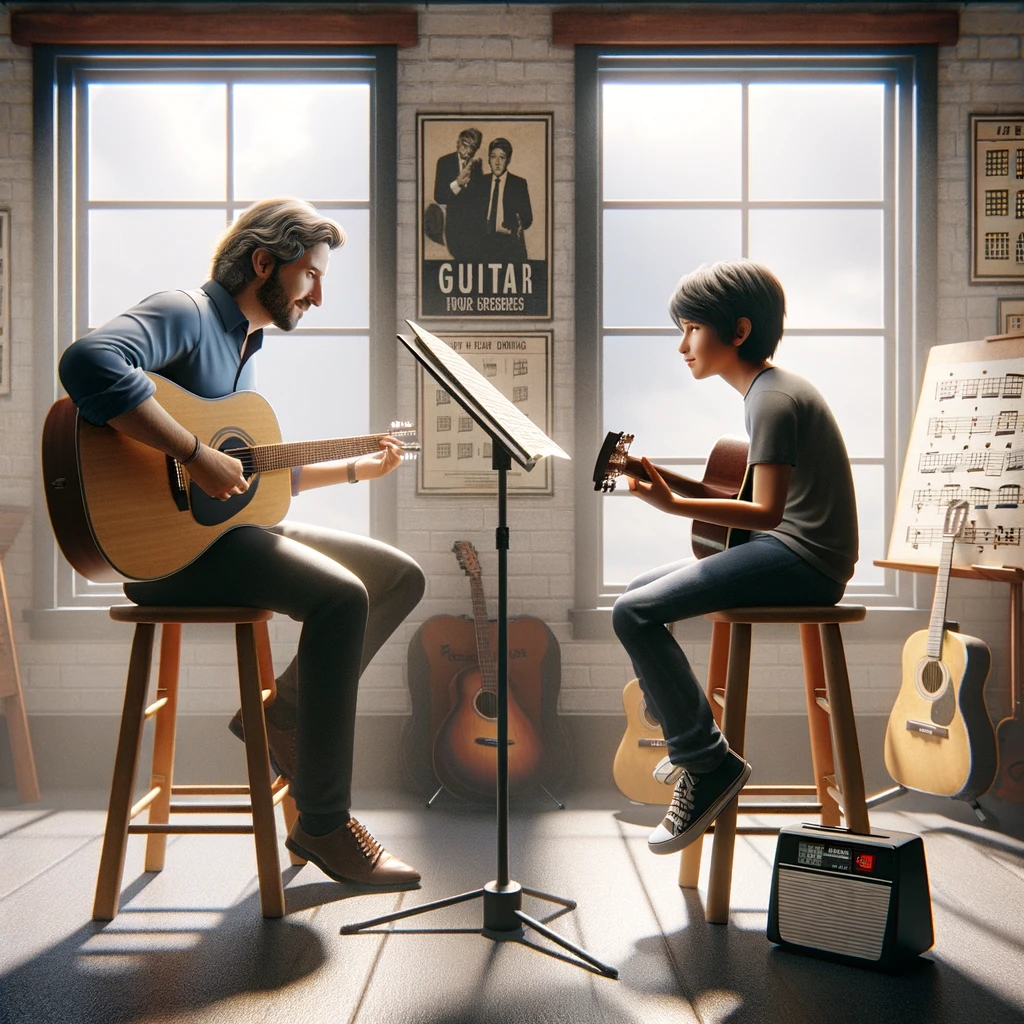
Nurturing Your Musical Journey
For those of us learning the guitar, it’s essential to focus on nurturing our musical abilities rather than rushing to purchase a high-end guitar. The allure of a premium instrument is undeniable, yet the essence of our early guitar journey should be centered on building a strong foundation of skills and knowledge.
Investing in Personal Development
Allocating resources towards enriching our learning experience is a wise strategy. This means opting for quality beginner lessons, valuable learning materials, and practice tools that genuinely contribute to our growth. Such investments not only expedite our progress but also ensure we’re laying a robust base for our music.
Embracing a Vision for the Future
Adopting a forward-thinking approach to our guitar playing encourages us to make plans with our future selves in mind. As we refine our skills and clarify our musical aspirations, we’re better positioned to make judicious choices about when and how to upgrade our gear. This patient, strategic mindset helps us to budget for and acquire instruments and accessories that truly resonate with our evolving talents and tastes.
Strategizing for Upcoming Investments
Crafting a thoughtful strategy for future guitar acquisitions is a key step for any serious guitarist. Taking stock of our progress, preferences, and financial situation allows us to outline a plan that supports our long-term objectives. Whether it’s the genres we’re drawn to or the specific features we’re after, this careful consideration ensures our investments enrich our musical expression and facilitate our growth as artists.
| Benefits of Investing in Growth | Importance of Long-Term Perspective | Tips for Planning Future Purchases |
|---|---|---|
|
|
|
Conclusion
As we conclude our exploration of why beginners don’t need expensive guitars, it’s important to recap the key reasons that support this notion. By opting for budget-friendly options, beginners can prioritize the learning process and focus on mastering the basics without the pressure of a hefty investment.
Remember, a high price tag doesn’t guarantee faster learning or better musical results. The value for money lies in the wide range of affordable guitar options available, allowing beginners to save money and focus on skill development, technique, and fostering creativity.
martin@chordexplorer.com
FAQ
Why don’t beginners need an expensive guitar?
Are there budget-friendly guitar options available for beginners?
Why is exploring different guitar gear important?
How can cheaper guitars be durable and easier to care for?
Isn’t owning an expensive guitar the ultimate goal?
Can affordable guitars have good quality?
Shouldn’t beginners focus on expensive equipment for skill development?
Is there a supportive community for beginner guitarists?
Does a higher price always mean better quality in guitars?
Should beginners invest in expensive guitars right away?



